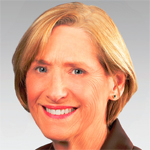“Both the ARHP and the ACR have been important to my career,” she says. “I’ve had the opportunity to meet and develop collaborations with people from all over the country. Volunteer opportunities from both have given me a lot of new skills and exposure, and have been beneficial in many ways.”
She received the ARHP Distinguished Scholar Award in 1997, the STAR Award in 2005, and the ARHP Presidential Award in 2003 and 2010.
‘Follow your passion, but also pay attention to what other people are doing and try to integrate information from different fields.’ —Patricia Katz, PhD
Q: What is the most fulfilling part of your job?
A: I really enjoy interacting with my colleagues, both here at UCSF and elsewhere. That is very fulfilling. And I just love the creative part of science, whether it’s thinking about a new idea, starting a new study, or trying to tease out what is important from study results. That creative spark is incredibly fulfilling.
Q: What advice do you have for young scientists entering this field?
A: Follow your passion. If you are going to stick with something for a long time, you really have to love it. So follow your passion, but also pay attention to what other people are doing and try to integrate information from different fields.
Q: What has changed the most during your career?
A: The measurement science of patient-reported outcomes has changed tremendously. Rheumatology has always been at the forefront of developing and using patient-reported outcomes. The standards have really improved over time. Rheumatology is still leading the way, even in some of the newest measurement technologies and techniques.
ARHP Distinguished Educator Award
 Susan Klepper, PT, MS, PhD, Pediatric Physical Therapist, New York
Susan Klepper, PT, MS, PhD, Pediatric Physical Therapist, New York
Background: Dr. Klepper never intended a career in pediatrics. Then she noticed her 4-year-old son had a different gait. His fingers were swollen. So were his wrists.
She suspected childhood-onset arthritis, and she was right. She returned to graduate school, and her focus was pediatrics, in particular physical fitness in children with JIA. Her current research focuses on the performance of healthy children and children with JIA on the 6-Minute Walk test, which gauges functional exercise capacity.
“It is both the personal stories that parents and kids share and the ‘puzzle’ that each child’s problems present,” that keeps her engaged, Dr. Klepper says. “Additionally, the rheumatology community is multidisciplinary and there is respect among members for each person’s knowledge and skill in taking care of individuals with inflammatory disorders.”



